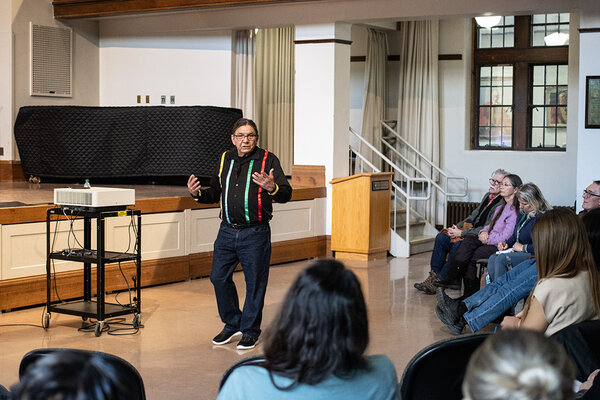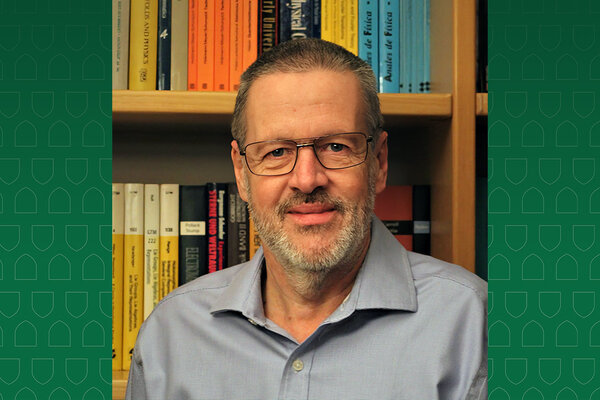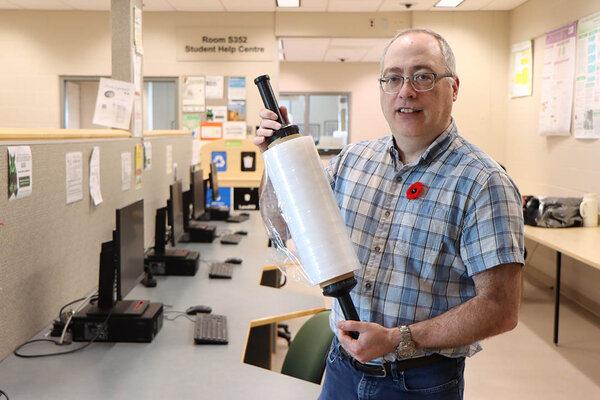
Sessional lecturer aims to support students with mental illnesses
Glorie Tebbutt is fundraising for a bursary and a scholarship for undergraduate students
By Shannon Boklaschuk
Glorie Tebbutt knows what it is like to be a post-secondary student living with mental illness.
Tebbutt, a University of Saskatchewan sessional lecturer, remembers when bipolar disorder left her “unable to function” for nearly two years during her PhD studies. She was too ill to complete her doctorate.
Today, however, Tebbutt is healthy and is a thriving instructor in the Department of English in the College of Arts and Science. She was a 2018 recipient of the Sylvia Wallace Sessional Lecturer Award, which annually recognizes the important and essential contributions of sessional lecturers to the U of S teaching community.
“Becoming well has been both a long journey and is a daily choice,” said Tebbutt.
“The cliché ‘it takes a village’ applies to those living with a mental illness. I have had that village: excellent psychiatric care, a loving family, wonderful, supportive friends, lovely housing and meaningful employment.
“In 16 years of sessional teaching, I have never missed a class due to symptoms of my mood disorder. People can live with a serious mental illness and become well and excel.”
Along with the Sylvia Wallace Sessional Lecturer Award, Tebbutt received a $1,000 prize from the Gwenna Moss Centre for Teaching and Learning at the U of S. She has decided to use the money to establish a bursary and a scholarship for undergraduate U of S students with mental illnesses.
“I want us, as a campus community, to begin to think differently about mental illness and functionality and acknowledge the strength, determination and resilience that some of our undergraduate students are living examples of,” Tebbutt said.
“I wanted the award money to be generative, and what could be more generative than supporting the undergraduate education of students?”
As Tebbutt researched various undergraduate student awards, she found ones that recognized students’ academic achievements, leadership, aspects of their identity and particular physical illnesses or physical disabilities. However, there was no award acknowledging students coping with mental health challenges, she said.
Tebbutt wants to change that, noting many students on campus study while dealing with these diagnoses.
“The current research and pharmacological advances in relation to the treatment of mental illnesses allow a number of students to pursue their academic goals,” she said.
“In fact, statistics from Access and Equity Services suggest that in the last three years, in particular, there has been an exponential shift in the number of students seeking some type of accommodation who self-identify as coping with at least one mental health diagnosis.
“Three years ago, AES reports that 28 per cent of students seeking accommodation identified as having a mental health diagnosis; last year, that number was 34 per cent and this year it was 47 per cent. These statistics do not account for the many students across campus who do not seek accommodation but are coping with a mental illness.”
Tebbutt received scholarships during her graduate studies and knows what a difference the financial boost can make to a student. She is currently working on the terms of the new awards and will proceed with fundraising to create endowments for the scholarship and the bursary once the terms are established. She hopes to begin fundraising this summer and invites people from across campus to support her efforts.
“I hope the awards will be a catalyst in the conversation about mental illness and functionality, on campus and beyond, about what is possible for students coping with and—in some cases—thriving despite their living with a diagnosis of a mental illness,” said Tebbutt.
“While there is a positive shift in how we are talking about mental illness, the stigma remains so powerful. I want the awards to acknowledge, support and celebrate students who are coping with a mental illness as they pursue their post-secondary education. I hope the awards help us begin to talk about, recognize and celebrate what is possible and what is already taking place.”
Tebbutt said she is honest about her bipolar disorder diagnosis with her students, noting “I have a mood disorder and that is one part of my story, but it does not define me.” She said she enjoys learning with and from her students, and she is very grateful to be acknowledged for her work with them.
“Parker Palmer observes that ‘true vocation joins self and service,’ and he quotes the American theologian, Frederick Buechner, who defines vocation as ‘the place where your deep gladness meets the world’s deep need,’ ” said Tebbutt. “Teaching brings me deep gladness, and I attempt to meet students’ deep need for stimulation and encouragement.”


